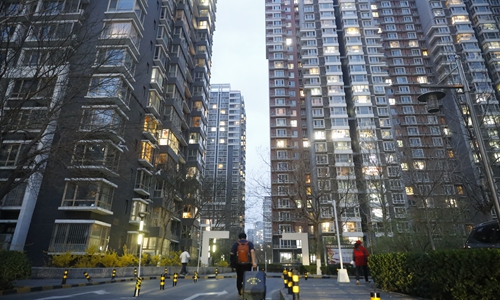Beijing resident Feng Xiangqian takes the first train from Hubei to Beijing since travel restrictions were eased, and arrives at Beijing West Railway Station at 5:50 pm on Wednesday. Feng finally returned home in Beijing's Shijingshan district after being trapped for two months in Hubei amid the COVID19 outbreak. He will be quarantined at home for 14 days. Photo: Li Hao/GT
By Wang Qi
Under pressure from the growing number of imported coronavirus cases, megacities in China are turning to technology to monitor returnees’ home isolation. However, many believe that home isolation is flawed, as a lack of strict and precise supervision can lead to people violating the rules.
Shanghai, the international port in East China with over 24 million permanent residents, has recorded at least 112 imported infections. The city is using a magnetic door system to manage arrivals who were allowed to go into home isolation after testing negative and signing a legally binding guarantee.
The magnetic door system consists of a magnetic door and a specially designed APP. If anyone under home isolation opens the door, an alarm will be transmitted to community workers through the internet. According to cnr.cn, the Minhang district of Shanghai has set up 450 of these devices since late February, and there is a total of 629 people in 444 households from 27 countries currently under home quarantine observation.
Beijing, another city in China facing pressure from imported cases, recently started trialing a monitoring system for regulating home isolation.
According to Qianlong.com, the monitoring system is set in a public space outside the gate door in the stairway. The system’s camera can detect and record people’s movements and faces, enabling community workers to view the situation in real-time, greatly saving on manpower.
The system was first implemented on March 19, and used in nine households in Haidian district.
Home isolation is an alternative method to designated isolation but is believed to be less strict. However, given the strain on infrastructure and public resources, analysts believe strictly implementing home isolation is a more practical solution for megacities.
According to Xinmin Evening News, as an open international port, about 55 international flights land in Shanghai every day, bringing more than 10,000 arrivals, which means that designated quarantine is a costly option for the city.
Hong Kong faces a similar situation to Beijing.
The Hong Kong government is implementing a type of smartband for people under quarantine, which is able to detect the real-time geo-location of a quarantined person without violating their privacy.
Currently with a total 150 imported infections, Beijing is a more determined supporter of designated quarantine for arrivals from overseas, especially after the first domestic infection related to an imported patient’s violation of home isolation occurred in mid-April.
The Beijing government has stipulated that all returnees from overseas must receive a nucleic acid test and undergo 14-day quarantine in designated hotels. Healthy people returning to Beijing domestically will undergo self-isolation at home, as their health status can be determined through a special QR code.
“It is something worth thinking about, as the rules of home isolation are flexible without proper and strict supervision,” said a community volunteer from Beijing’s Shijingshan district, who picked up a resident from Hubei Province after he arrived and registered at the front gate of his community.
The community worker told the Global Times that not all communities are using high-tech to monitor people under home isolation, however, people are using different methods such as putting paper seals on doors or increasing the number of home visits to ensure strict supervision.
As with Shanghai, the reporter learned that Beijing requires all returnees to sign a legally binding guarantee, promising not to break the rules of home isolation.
A returnee from Huangshi in Hubei Province surnamed Feng told the Global Times that he will obey the home isolation rules to avoid any unnecessary unpleasantness and help the city advance its victory against COVID-19.


